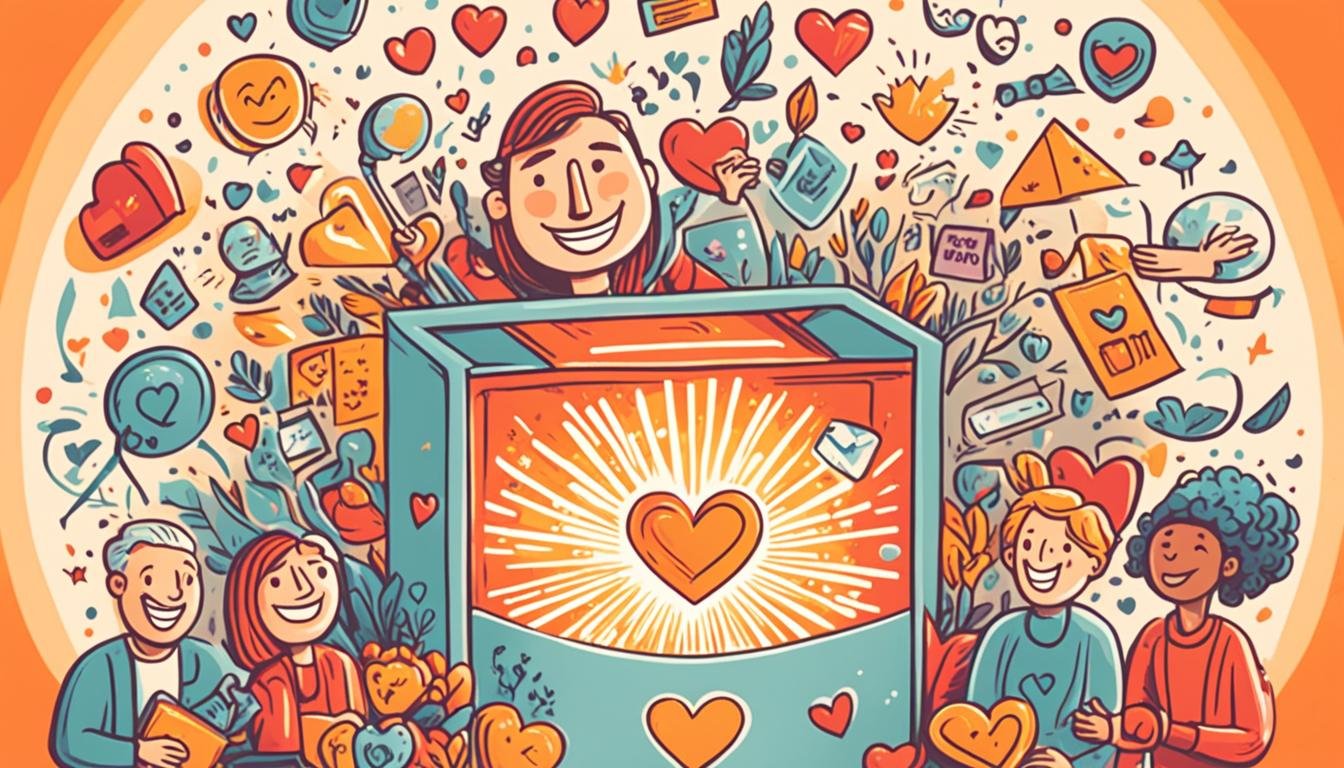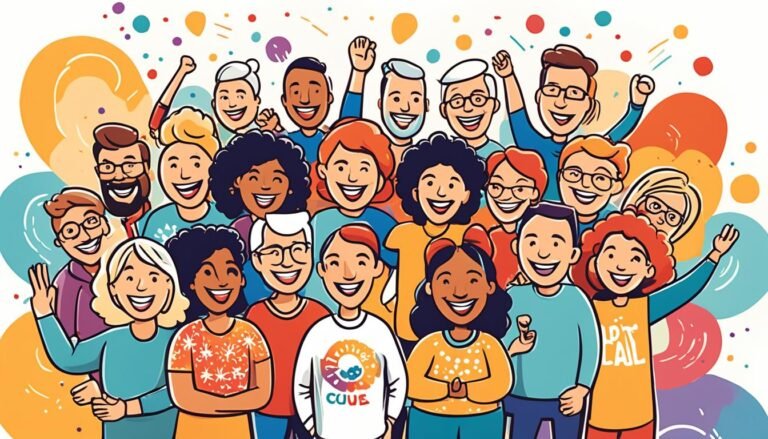The Gift of Empathy: Understanding and Connecting with Others’ Experiences
Albert Einstein shared, “Only a life lived for others is a life worthwhile.” These words show what empathy is all about. It’s a special gift that lets us truly get others. Empathy is more than just feeling sorry for someone. It needs us to be smart about emotions and to care. And, we must be ready to see things from another point of view. This way of feeling is key for strong relationships. It helps us understand others, connect deeply, and move forward together.
Key Takeaways:
- Empathy is the ability to understand and connect with the experiences of others.
- Developing emotional intelligence is crucial for practicing empathy.
- Empathy fosters deeper understanding, compassion, and meaningful relationships.
- Albert Einstein’s quote emphasizes the significance of living a life driven by empathy.
- Throughout this article, we will explore the concept of empathy, its benefits, and strategies for cultivating this remarkable gift.
What is Empathy?
Empathy is key in how we connect with others. It means we can feel and share the emotions of those around us. With empathy, we move past our own views. We see and feel things from the standpoint of others. This helps us truly understand them.
This isn’t just about feeling sorry for someone. It’s really understanding where they’re coming from. It means feeling what they feel and realizing their unique situation.
“Empathy is about finding echoes of another person in yourself.” – Mohsin Hamid
Being emotionally tuned in is key for empathy. It lets us notice the little signs that show how someone else feels. This awareness helps us be kinder and more supportive to others.
Seeing things from someone else’s view is also vital. It means putting our own thoughts and feelings aside. Then, we focus on understanding their perspective. This makes our chats more meaningful and caring.
Why is Empathy Important?
Empathy is crucial in our lives, both personal and professional. It lets us build better relationships and solve problems. It makes our world a kinder, more welcoming place.
Empathy is helpful in many situations. It could be consoling a sad pal or supporting a teammate. It lets us walk through the ups and downs of life together. That’s how we grow closer and celebrate our differences.
The Benefits of Empathy
Empathy is a great skill that changes our life. It helps us to really know others. And it makes our connections stronger. Empathy also boosts our emotional smarts.
We can truly understand others when we show empathy. We feel what they feel and see what they see. This makes us closer to people and helps build trust.
People who are empathetic do better in social settings. They make stronger connections and have a good support system. They also know how to handle emotions well. This includes their own feelings and those of others.
Moreover, empathy helps us understand our own feelings. This makes us better at talking and solving problems. We learn to listen and respond to others’ needs gently.
The Power of Human Connection
Empathy is all about really getting people and caring about their stories. It helps us offer a space where everyone feels valued. And where they can truly share who they are.
Empathy is seeing with the eyes of another, listening with the ears of another, and feeling with the heart of another. – Alfred Adler
It also brings more kindness and understanding to how we deal with others. Empathy removes divisions between us. It makes us feel more as one, helping us in society and in our communities.
Fueling Emotional Intelligence
Understanding our feelings and those around us is key in today’s world. Emotional intelligence involves knowing ourselves, managing our emotions, understanding others, and handling relationships well.
Empathy helps us become emotionally smarter. We notice others’ needs and emotions better. This lets us support people and have better relationships.
- Increased empathy leads to improved personal and professional relationships.
- Empathy fosters a positive and inclusive work environment, increasing productivity and job satisfaction.
- Empathetic leaders inspire trust, promote collaboration, and create thriving teams.
In a world that often makes us focus on ourselves, empathy is a reminder. It’s a reminder of the value of connecting with others. When we choose empathy, we not just help others but grow and feel fulfilled too.
Developing Empathy Skills
Learning empathy helps in making deep connections and understanding people better. It needs you to be emotionally smart, a good listener, and aware of others’ feelings. By working on these areas, you’ll get better at putting yourself in others’ shoes, leading to closer relationships.
Active listening is key to being empathetic. It means really focusing on what the speaker is saying, and their body language. This helps make the other person feel valued, which can lead to a more open talk. You’ll start to see things from their point of view.
Reading non-verbal signs is also important. Things like eye contact, posture, and how they’re talking can show a lot. When you pick up on these signs, you can figure out how they’re truly feeling. This deepens your understanding and connection with them.
Remember, empathy is more than just hearing words. It’s about feeling the emotions underneath.
Being socially aware is crucial, too. It means knowing what people around you might be going through. This can help you spot and work against unfair treatment and issues that affect many. You become part of making our world kinder and fairer for everyone.
Building up your emotional smarts is a big step towards empathy. It’s about managing your own feelings while understanding others’. This way, you can handle tough times with kindness, making your bonds with others even stronger.
By working on these skills, you can be more empathetic in your daily life. It’s a path of growth and learning that’s always ongoing. The more you put into it, the more meaningful and deep your connections with others will be.
The Role of Compassion in Empathy
Compassion is key to understanding others and building deeper connections. It’s more than just getting someone’s story. It’s about wanting to help ease their pain. With compassion, empathy becomes a powerful force for good, benefiting both sides.
Empathy lets us step into others’ shoes, feeling their emotions. But it’s compassion that turns this understanding into meaningful help. It’s the push we need to act and make things better for them.
Compassion makes us eager to help out. It pushes us to be there, support, or listen. By acting with compassion, we make our world a warmer, more caring place.
Showing compassion makes us feel closer to each other. It’s the heart of strong, lasting bonds. Being compassionate not only helps one person but can start a chain that spreads care to many.
“Compassion is not a passive emotion, but an active one that drives us to take action and make a difference in the lives of others.”
To be more compassionate, we must be aware of our own feelings and those of others. This leads to better empathy. By being kind and understanding, we can fill the world with more peace and love.
The Benefits of Compassionate Acts
- Increased emotional well-being and happiness
- Enhanced social connections and relationships
- Improved mental health and reduced stress levels
- Greater sense of purpose and fulfillment
- Positive impact on the overall well-being of individuals and communities
Compassion is a game-changer. It can make a big difference in our own lives and those around us. By choosing to be compassionate, we build a kinder, more understanding world.
Overcoming Barriers to Empathy
Empathy is the ability to deeply understand others’ feelings and experiences. Yet, several barriers often stand in our way. Overcoming these obstacles allows us to better connect with people around us.
1. Prejudice and Bias
Our own prejudices and biases can stop us from fully empathizing with others. It’s key to spot and challenge these negative beliefs. By welcoming diversity and trying to see from others’ points of view, we break these barriers down.
2. Judgment and Stereotypes
Judging others based on stereotypes can prevent true empathy. It’s crucial to stop assuming and start listening without jumping to conclusions. Real empathy means looking past generalities and valuing every person for who they are.
3. Emotional Distance
Feeling emotionally distant makes empathizing hard. To bridge this gap, we must work on understanding our own emotions. By doing so, we can connect with others more profoundly.
Empathy means understanding others and tearing down the walls that divide us.
Improving our emotional intelligence and reflecting on our actions helps grow empathy. Being open and questioning our biases builds a path to true understanding and empathy.
Empathy is a powerful tool. It strengthens our bonds and increases kindness in our world. By tackling these obstacles, we unlock empathy’s full potential and nourish our lives with deep, fulfilling relationships.
Empathy in Interpersonal Relationships
Empathy is key to building deep connections with others. It involves understanding their feelings and experiences. This leads to trust, compassion, and a better understanding of each other. We’ll look at how empathy makes communication better, helps solve conflicts, and strengthens bonds.
Empathy helps communication become more effective. It means really listening and understanding the other person’s feelings. When we show empathy, our talks become open and free of judgment. Both people feel like their thoughts and emotions are understood.
In conflicts, empathy is a powerful aid. It helps us see others’ points of view and their emotions. By doing this, we can talk through tough situations with care. Empathy helps move past our own assumptions. This leads to finding solutions that work well for everyone.
In relationships, empathy creates stronger emotional ties. It shows we truly care about how others feel. By connecting with others emotionally, our bonds grow stronger. This makes for a more trusting and stable relationship.
Examples of Empathetic Communication
1. “I see you’re under a lot of stress. Do you want to talk about it?”
2. “I know this is hard for you. I’m here to help. How can I support you?”
3. “It seems like today was tough for you. Do you want to share? I’m all ears, no judgment.”
These examples show how to communicate with empathy. They involve listening well, acknowledging feelings, and showing a real desire to help. Doing this makes communication better and relationships stronger.
Practicing empathy is vital for growing closer with others. It helps create a space where emotions and understanding can flourish. Acknowledging someone else’s feelings builds trust and respect. This leads to deeper, more meaningful connections.
Empathy in the Workplace
Empathy is key in making the workplace better. It leads to a happier, more efficient place to work. When we understand and connect with others, it boosts teamwork. This makes everyone feel included and supported at work.
Being empathetic makes the work setting caring and open. It means really listening to different viewpoints. This leads to solutions that consider everyone’s needs and ideas.
Empathy in Leadership
“The best leaders have lots of empathy and know the value of every team member. They inspire and encourage others by caring and understanding.”
Good leaders create a place where staff can be open and innovative. They listen and seek to understand their team. This helps address individual needs and boosts growth.
Empathy makes teamwork easier and more effective. When people feel heard and cared for, they work better together. They use their unique talents to achieve common goals.
Creating an Inclusive Work Environment
An inclusive place makes all feel welcome and valued. Empathy is crucial in making this happen. It helps people understand and appreciate each other’s differences.
Choosing empathy over bias breaks down walls. It encourages respect for everyone. This makes teamwork and creativity grow.
“Empathy makes a workplace where everyone is appreciated and can share their thoughts. It builds a strong community.”
When empathy is part of daily work life, everyone benefits. It boosts happiness, satisfaction, and how well we work together. Empathy is a skill that improves leadership and team spirit. It makes the office a place where everyone thrives.
Conclusion
In this article, we learned how empathy, emotional intelligence, and talking with heart can change lives. Empathy helps us feel with others. It makes connections more real.
Being able to sense and share feelings is key. This is more than just knowing how someone else feels. It’s about acting with kindness because you understand their situation.
Imagine understanding and supporting someone, really getting their feelings. This is the power we have with empathy. These small acts make people happier and our world kinder.
This skill is about listening well, even to what’s not said, and seeing what others see. This makes us care more and brings us closer to people. Every day, we can all choose to be a little more caring.








